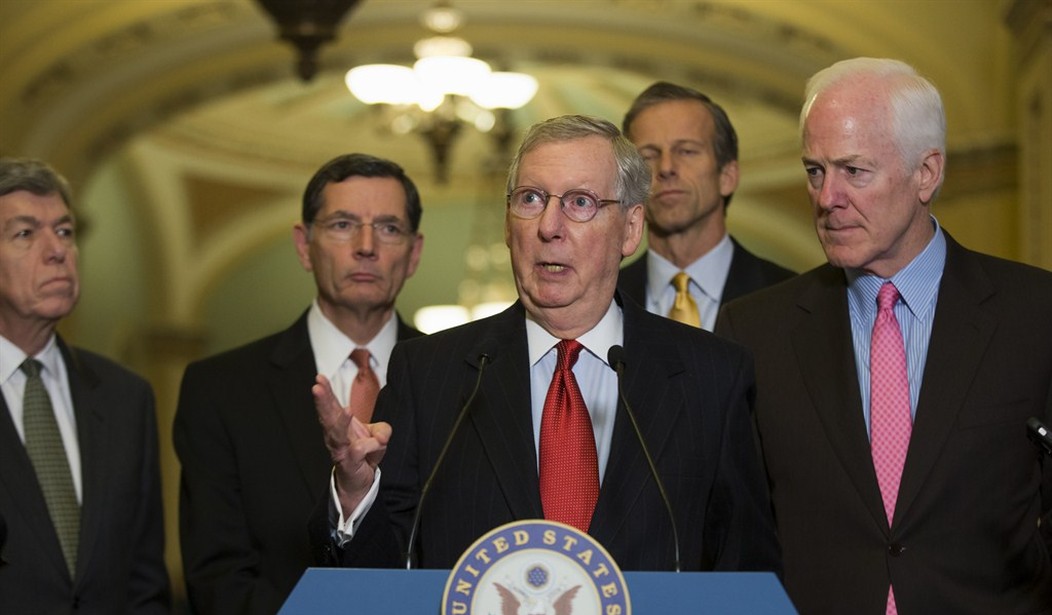Today, Senate Republicans are debating whether to restore filibusters of judicial and executive nominations. Last year, soon-to-be-ex-Senate Majority Leader Harry Reid went nuclear; changing the filibuster rules on such nominations to require a simple majority for passage. At the time, conservative columnist George Will said,"It's a sad day for what used to be a great deliberative body." Now, Republicans are split on what to do when they take control of the Senate next year (via the Hill):
“I think it’s rank hypocrisy if we don’t,” Sen. John McCain (R-Ariz.) said when asked about reversing the rule change.“If we don’t, then disregard every bit of complaint that we made, not only after they did it but also during the campaign,” he added. “I’m stunned that some people want to keep it.”
But other Republicans say now that Democrats have changed the rules to allow nominations aside from those to the Supreme Court to clear by majority vote, the GOP should go with the flow.
“I’m leaning toward leaving it alone,” said Sen. Chuck Grassley (R-Iowa), the incoming chairman of the Senate Judiciary Committee.
Senior Republican members of the Senate Judiciary Committee see little tactical advantage in restoring the 60-vote threshold for nominees when they control the agenda next year.
They argue that if Obama nominates officials and judges who are too extreme, the Senate Judiciary could simply not report them to the floor, or incoming Senate Majority Leader Mitch McConnell (R-Ky.) could decide not to schedule them for votes.
They assert that reversing the nuclear option would not benefit them in the long term because Democrats would likely trigger it once again if they reclaimed the majority while their party controlled the White House.
…
Republicans on the other side of the debate, however, warn that if the GOP adopts the change, it could lead to further cuts to minority rights in the Senate going forward.
“Any diminution of the right to filibuster a nominee means someday there’s a greater chance of getting rid of the legislative filibusters. Once you go down that road the next step is to get rid of the filibuster for legislation,” said one Senate GOP aide.
…
Three Republicans angling for the presidency — Sens. Rand Paul (Ky.), Ted Cruz (Texas) and Marco Rubio (Fla.) — who might stand to gain from keeping the nuclear order have kept a low profile on the question. Their offices declined to comment Monday afternoon on the debate.
The conservative groups most active in the judicial confirmation wars, however, firmly support keeping the simple-majority threshold for nominees.
Carrie Severino, chief counsel to the Judicial Crisis Network, said that restoring the 60-vote threshold for nominees would not bind future Democratic majorities to abide by it.
“It’s an untenable situation to have a 60-vote standard for Republicans and a 50-vote standard for Democrats, which is what I think it would turn into,” she said. “I don’t think you can put the genie back into the bottle.”
Recommended
So far, it seems conservatives and right-leaning media outlets agree that restoring the 60-vote threshold isn't in the best interest of Republicans.
From the WSJ editorial board:
Senate Republicans are debating whether to restore the 60-vote filibuster rule for confirming presidential nominees to the executive branch and lower courts. It’s nice to imagine a Kumbaya moment that would restore Senate comity, but this is a case when the GOP could do more political harm if it tries to undo Harry Reid ’s damage."
From the editorial board of the National Review:
Bringing back the judicial filibuster would be more antiquarian and quixotic than restorative. . . .The 60-vote rule for legislation, thanks to its long history of use and the range of competing interests in the Senate, is likely to survive under either party. It does not owe its survival to the vitality of the judicial filibuster. There are a number of difficult questions that face next year’s Republican Senate majority. This is not one of them.”
“It is my contention that if we are going to have fidelity to the constitution then we should not put it [the judicial filibuster] back in place because it violates the constitution.”
“The only real prospect for much-needed improvement in the federal courts requires a good Republican president and a Senate Republican majority that can exercise its majority power to confirm good nominees. It would be a massive folly for Senate Republicans to deprive themselves of that power.”
“If Republican senators actually try to “denuclearize” the judicial-nomination process — meaning they would undo the “nuclear option” Reid put in place in 2013 and would once again require 60 votes to break a filibuster against judicial nominees — they will catalyze one of the biggest, most brutal civil wars the right-of-center coalition has seen in the past decade. Reinstating the filibuster for judicial nominations is a bad idea on the merits and, on multiple levels, astoundingly foolish on the politics.
“No, no, no, no, no to the idea moving around some Senate GOP circles of 'restoring' the judicial filibuster.First, the GOP senators have to understand that this is not simply an internal matter, a question of the "club's" agreed-upon rules. It is an issue of incredible and obvious importance to all Americans, not just 100 senators, and understood to be such by millions of grassroots voters, and thousands of contributors."
Hewitt wrote another column today telling Senate Republicans that they shouldn't restore the filibuster.
Let's see what happens.
























Join the conversation as a VIP Member